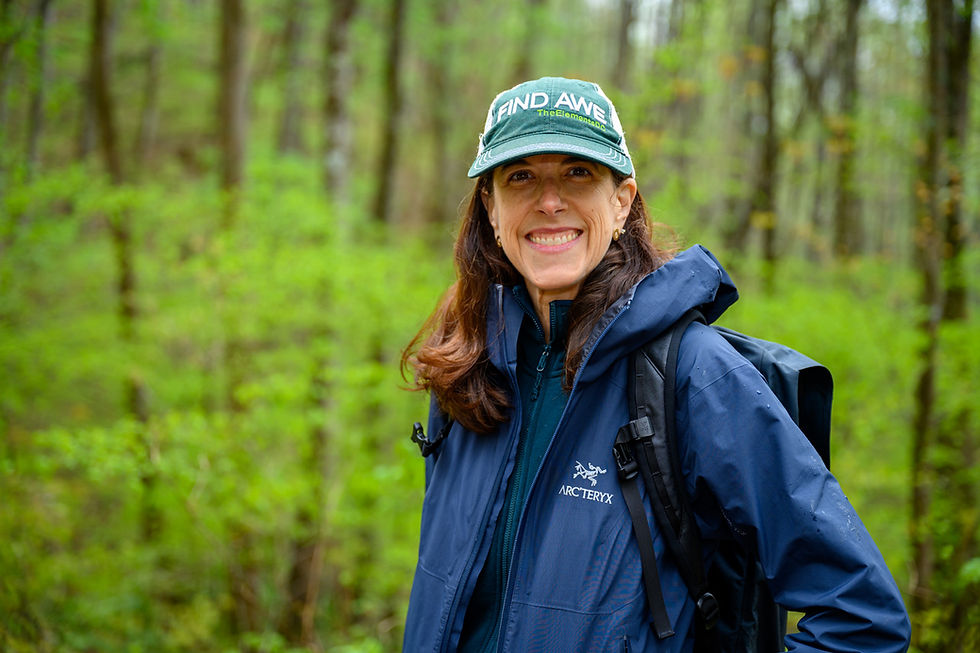A Post Earth Day Self Assessment: How Connected to Nature Are You?
- hikingresearch
- Apr 27, 2013
- 3 min read

Wildflowers in Great Smoky Mountains National Park (North Carolina, USA) Photo by Mark Ellison
The roots of the first Earth Day in 1970 are found in the environmental movement of the 1960’s, ignited by activist such as Rachel Carson who brought concern for the environment to the forefront. Rachel Carson was driven to protect the environment, but also knew the value and the Sense of Wonder that could be ignited by experiencing it.
Many who have been active in helping to protect the health of the Earth also have a deep connection to nature that is fostered by time spent there. Living in a world where over half the population now resides in cities threatens that connection, as does “techno addiction” that keeps many people glued to a screen for hours at a time. Our link to nature is being severed by paved and virtual highways that increase the speed at which we experience everything. If the movement to protect the health of our natural world is to continue, it will need people who have been inspired by their time in nature, who clearly understand the direct link between healthy nature and healthy people. How will people who live in urban sprawl who have never been in nature be inspired to experience and protect it? Those of us who have been captivated by the natural environment must share that “sense of wonder” with others.
Connectedness to Nature Scale
How connected to nature are you? The Connectedness to Nature Scale developed by Stephan Mayer and Cynthia McPherson Frantz of Oberlin College might help you more clearly understand this. This valid and reliable scale prompts participants to respond to how they generally feel related to the following statements from one (strongly disagree) to five (strongly agree). Take a minute to reflect on these statements: -I often feel a sense of oneness with the natural world around me; -I think of the natural world as a community to which I belong; -I recognize and appreciate the intelligence of other living organisms; -I often feel disconnected from nature; When I think of my life, I imagine myself to be part of a larger cyclical process of living. -I often feel a kinship with animals and plants. -I feel as though I belong to the Earth as equally as it belongs to me. -I have a deep understanding of how my actions affect the natural world. -I often feel part of the web of life. -I feel that all inhabitants of Earth, human, and nonhuman, share a common ‘life force’. -Like a tree can be part of a forest, I feel embedded within the broader natural world. -When I think of my place on Earth, I consider myself to be a top member of a hierarchy that exists in nature. -I often feel like I am only a small part of the natural world around me, and that I am no more important than the grass on the ground or the birds in the trees. -My personal welfare is independent of the welfare of the natural world
Connecting to Nature
There are a few things you can do as a self assessment to strengthen your connection to nature. Reflect on the following questions: -How much time do you spend in nature each day? -How much screen time do you have each day? -Do you have a place in nature you can escape to on a regular basis? -Are you involved in volunteer activities that positively impact the environment? -Are you actively engaged in learning more about the natural environment? -Do you have a hobby such as hiking, birding, or gardening that inspires you to be outside? -Do you read books or articles about the natural environment to strengthen your knowledge and for inspiration?

Waterfall in Great Smoky Mountains National Park (North Carolina, USA) Photo by Mark Ellison
To strengthen your connection to nature go for a hike and enjoy the solitude that if offers. This should be a “meditative hike” with no time line that allows your mind to slow down. A backyard garden also offers an escape and helps clear the mind. Just getting your hands in dirt offers health benefits. When spending time in nature utilize all of your senses, not just relying only on what you can see. This helps to stimulate different parts of the brain. When in nature spend time reflecting, perhaps on your impact to the environment. What choices have you made that are impacting the environment, positively or negatively? Take time to draw aspects of the natural environment. This will help you see details that you may have missed just looking quickly. Earth Day has come and gone. Don’t allow the inspiration to experience and protect nature fade until another Earth Day is celebrated. Make a commitment to spend time in nature, and find a way to positively impact the environment.








Comments